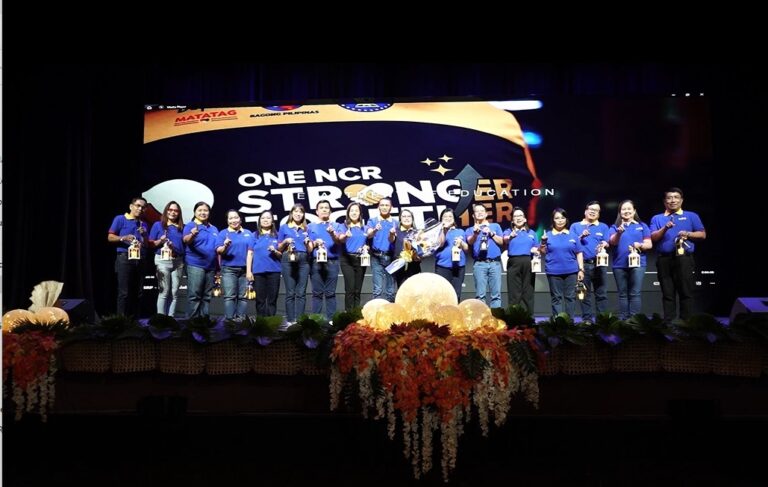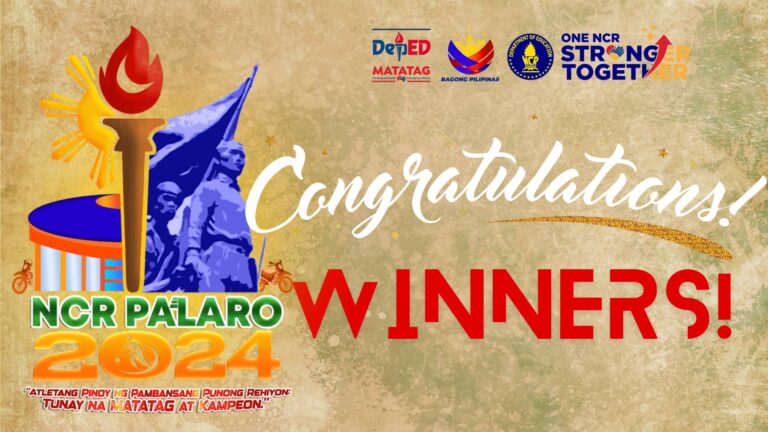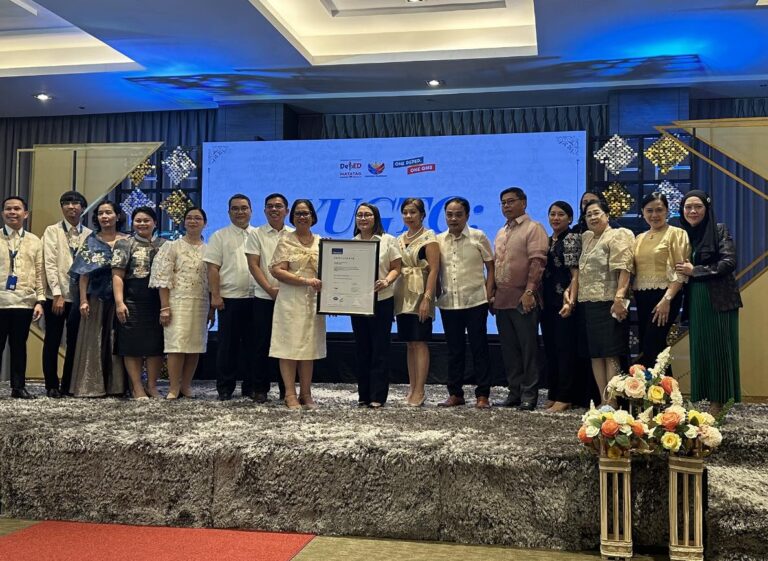Two Powerful Women, Empowering both Men and Women: Transforming the lives of the Filipino Learners

Highlights of VP Sara’s Message during the International Day of Education
Navigating the Nexus: DepEd-NCR’s Blueprint for Educational Revitalization
The Vice President and Secretary of Education, Sara Duterte, expressed her gratitude to the stakeholders, including international and local partners, ambassadors, and ministers of education, for the unwavering support they continuously provide to the department.
In her speech during the International Day of Education, she stated that it serves as a resounding call to action, urging us all, individuals, civil society members, and policymakers, to unite and champion the cause of providing our children with the finest primary and secondary education possible.
As she cites an array of challenges, such as natural disasters and socioeconomic adversities, she stresses that the basic education system in the Philippines remains steadfast. However, the findings of the 2022 Program for International Student Assessment, or PISA, are indicators of what we need to get done, and these results have ignited an even fiercer determination within her leadership to enhance our educational system with more clarity and focus.
“We are ready to address the specific actions that demand immediate attention. We must intensify our current interventions and take decisive actions to ensure that every child has access to a liberating, relevant, and inclusive education.”
She further urges stakeholders, including local and international partners, to unite. To reaffirm our shared commitment to make education a basic right, a public benefit, and a key to personal and social growth.
“Together, we aim for a brighter future focused on building strong and confident learners. Sana ay maging MATATAG sila.
Moreover, she expressed that today is a timely opportunity to renew our call to everyone—educators, stakeholders, and local and international partners—to work together.
“Our goal of enabling a better future for everyone is our effort in producing resilient learners.”
She continued reliving DepEd’s initiatives in 2023. Here, she mentioned the unveiling of the MATATAG Agenda, Bansang Makabata, and Batang Makabansa as the keys to resolving basic education challenges and the seven action points that were crafted to reinforce and support the implementation of the MATATAG Agenda through policy interventions.
First, prepare learners to be leaders, be resilient, creative, holistically developed, acquire 21st century skills, take pride in their national identity, and allow them to explore and participate fully and freely in local, national, or even global communities so they are exposed to diverse viewpoints and experiences regardless of their gender, religion, language, ethnicity, or financial background.
“We introduced the MATATAG curriculum and revised the K-10 curriculum under the K-12 program. We concentrated on key skills like reading, math, and social and emotional skills, especially for disadvantaged students. This curriculum also emphasizes teaching values and character development, in line with the Good Manners and Right Kata and Values Education Act.”
Second, bring learners back to the dynamic environment for learning, interaction, and discussion. Among the initiatives mentioned was bringing back full-in-person classes, for this allows them to enhance their knowledge and social skills in school.
Third, provide every opportunity for inclusiveness and equity for our learners.
“We must make sure that everyone, especially the vulnerable and marginalized, gets a fair chance.”
Teach cultural awareness in our curriculum, work on giving more opportunities to young kids, let everyone benefit from transformative education, and implement policies to prevent violence and discrimination in our schools.
Fourth, fast-track the creation of an inclusive, equitable, gender-responsive digital learning ecosystem for all.
“We understand how important it is for all children to have equal access to education.”
Make sure indigenous peoples’ educational students have more access to their cultural education. Improve special needs programs for students with special needs. Provide relevant education for the MADRASA Education Program for students both in public and private schools. Equip students with digital skills and digital citizenship awareness. So, they can use technology wisely and effectively.
“We have teamed up with internet providers to bring these technologies and digital tools to our schools in a way that is helpful for both teachers and students.”
Fifth, expand and empower our teacher force.
“We deeply appreciate the dedication and passion of our teachers. And we want them to feel supported as they work towards our students’ future.”
Offer professional development programs to help teachers grow. Reduce their administrative workload by hiring more staff. And provide protection through the GSIS-issued personal accident insurance policy in collaboration with the government service insurance system.
Sixth, reimagine governance to begin with the people, especially children.
“We envision a transformative approach to governance that prioritizes the active participation of our people.”
Involve students in meaningful dialogues. DepEd conducted the Learner’s Convergence 2023 to craft the National Action Plan for Learner Participation in July last year. This has impacted the country’s basic educational system.
Seventh, secure sufficient funding for educational priorities.
“We have been able to work for an increase in our budget allocation for 2024. This augmented funding will empower us to advance critical initiatives and fulfill our core mission of ensuring accessible, forward-looking, pertinent, and high-quality education for all…”
These seven actions and commitments guide our way forward as we work for our children to have the education they deserve in life.
Our VP and Secretary of Education ended her message by encouraging us all to be united and reaffirm our dedication to enhancing our educational system and our commitment to uphold the interests and future of our learners.
In a recent address by the esteemed Regional Director of the Department of Education – National Capital Region (DepEd-NCR), Dr. Jocelyn Andaya, urgent attention was drawn to the critical state of educational affairs within the region. With a tone resonant of Martin Luther King Jr.’s impassioned plea in “Why We Cannot Wait,” Dr. Andaya illuminated a series of alarming statistics plaguing the educational landscape.
Echoing concerns of low proficiency levels in international assessments like PISA, overcrowded classrooms persisting due to the triple shift strategy, and insufficient internet connectivity in senior high schools, Dr. Andaya left no doubt as to the gravity of the situation. Moreover, she highlighted the rise in various forms of bullying and underscored the imperative of addressing these issues promptly for the holistic well-being of learners.
A poignant reminder of historical precedents, such as the Monroe survey of 1925, served to emphasize the enduring nature of challenges facing the educational system. The clarion call for immediate action reverberated through the halls of education, urging stakeholders to unite in a concerted effort to effect tangible change.
Bolstered by recent successes in NCR (National Capital Region), including noteworthy results in PISA 2022 where NCR scored higher than the average Philippine scores in Mathematics, Reading, and Science despite the pandemic, Dr. Andaya laid out a comprehensive three-year plan to propel the NCR’s educational agenda forward. With private schools playing a pivotal role alongside public institutions, collaboration emerged as the linchpin for fostering diverse educational opportunities for the region’s learners.
Celebrating the DepEd-NCR’s remarkable 13-year winning streak in the national sporting event Palarong Pambansa, Dr. Andaya underscored the importance of unity and collaboration through the introduction of the “One NCR” initiative. This initiative seeks to forge a cohesive alliance among schools, educators, students, parents, and officials, underscoring the ethos of collective action.
Following an intensive strategic planning workshop, the NCR identified five key priorities to guide its educational endeavors:
1. Keep School – Age Children in Schools: A concerted effort to bolster enrollment rates in Kindergarten and Senior High School, with a focus on Universal Kindergarten and Senior High School participation.
2. Improve Foundational Skills of Learners: Ensuring equitable access to learning resources and enhancing foundational skills through targeted interventions.
3. Capacitate School Heads and Teachers: Establishing robust learning and development programs to equip educators with the necessary competencies for effective pedagogy.
4. Ensure a Learner-Centered Environment: Implementing flexible learning models and support programs to cultivate inclusivity and foster a conducive learning environment.
5. Strengthen Governance: Instituting a reliable Quality Management System (QMS) and aligning data management systems to enhance decision-making and compliance.
Each priority is accompanied by a meticulously crafted strategy and timeline for implementation, underscoring the region’s unwavering commitment to driving tangible improvements in learning outcomes.
In closing, Dr. Andaya reiterated the region’s steadfast dedication to nurturing competent, resilient, and responsible citizens through quality education. Embracing the principles of unity, collaboration, and community engagement, she expressed profound gratitude to all stakeholders for their invaluable support in advancing the educational agenda of the NCR.





